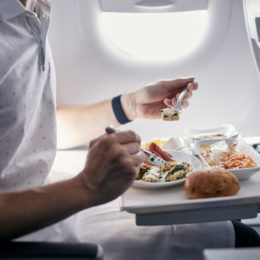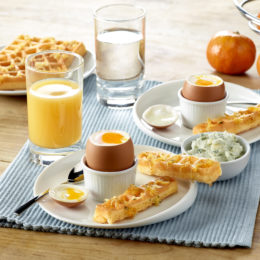With sales worth €35.6 billion in 2020 (compared to €50.4 billion in 2019, representing a 38% drop), the commercial restaurant sector was one of the hardest hit by COVID-19. The end of the pandemic and the resumption of tourism have revitalised the restaurant business, although the sector is still in recovery, a far cry from its 2019 benchmark levels.
In addition, new trends are emerging, that are shaking things up in the industry. While the digitalisation of orders and the boom in meal deliveries (up 85% between 2019 and 2021) are driving growth in the sector, inflation is undermining its economic recovery due to the rising cost of raw materials and a decline in consumer spending, forced by budget considerations.
In this context, commercial restaurants must also adapt to the new dietary habits of dining customers. For example, 49% of French people reported they were flexitarians in 2022, meaning it has become essential today to offer meatless dishes in response to this demand. Moreover, snacking and fast casual are noticeably picking up speed: while consumers still enjoy having a quick meal, they are now more than ever looking for healthy products made from scratch.
GERMANY
In Germany, the food service industry was worth €93.6 billion in 2019, accounting for 20% of residents’ total diets, following closely behind the retail food sector.
But COVID-19 appears to have left a permanent mark on European dietary practices. German consumers are increasingly attracted to flexible options, fast food and takeaway. In this context, snack food choices and e-commerce are gaining ground. Online food sales rose by 63% between 2019 and 2020.
Germans are attentive to the quality of what they eat, first and foremost. In their pursuit of naturalness, they look for healthy products that contain minimal chemical inputs, making Germany the number one organic market in Europe.
UK
In the United Kingdom, the food service sector was worth more than €61 billion in 2021. More and more members of Britain’s population appreciate online experiences, from making purchases to receiving customer service. In fact, the country is number one in Europe and number three worldwide in terms of having the most widespread online food trade.
Consumers there are very sensitive to ethical issues and to the environmental impact of the food they eat. Animal welfare is a concern for one in two British people, which partially explains the rise in vegetarian diets and the increased number of plant-based products. As a result, Britain is the biggest market for meat substitutes, just ahead of Germany.
Simplifying daily life in commercial restaurants
For breakfast, lunch, dinner or throughout the day, restaurateurs have to optimise their prep time while continuing to reinvent themselves. In other words, anything that can help express their interests and save them time is more than welcome! From this perspective, having access to high quality raw ingredients, intermediate goods or ready-to-serve products is a real advantage. And eggs, which are a vital part of many recipes, are an absolute must in this respect. Hygiene rules dictate that eggshells have no place in a commercial kitchen. In sizes ranging from 1 to 5 kilograms, fresh or frozen liquid egg (whole, yolks or whites) is an essential base to keep within easy reach, for both sweet and savoury dishes.
Are you looking for inspiration for a menu item featuring hard-boiled eggs in a salad or snack? A plain omelette or one with cheese or bacon? Or maybe egg bites to add texture and protein to a vegetarian dish? Cocotine’s egg products come in many shapes and forms, to simplify your daily life! And, for a touch of originality when revisiting your classics, our Egg Wraps can be used to replace traditional wheat or corn tortillas. In addition, thanks to the IQF (individual quick freezing) process, each piece is completely separated from the others, so there’s no risk of breaking one while detaching them, saving you time and energy!
A trusted partner on which you can rely
Between taste, convenience, prep time, food safety and more, there are many challenges facing restaurateurs on a daily basis. To help them, Cocotine has developed ranges of egg products and continues to innovate in response to their needs.
Being able to count on your suppliers is vital to ensuring the quality of your products, as well as the safety of the dishes you serve. Cocotine is a co-operative brand with 230 member farmers who supply our processing plants. Using no middlemen means improved traceability, and we also perform many tests along the entire production chain. This has earned us some of the most demanding certifications (including ISO 9001 and 22000, FSSC 22000, BRC and more).
With our organic product lines and the gradual elimination of caged eggs, Cocotine’s egg products come with commitments you can promote to your customers. Our “animal welfare cage-free” farming approach, which allows chickens to engage in natural behaviour, is another step in this direction, offering a response to increasing societal demand.
Restaurateurs who put their trust in Cocotine are guaranteeing themselves access to high quality egg products, to meet their daily challenges. We also supply our products to institutional caterers and agri-food companies .








